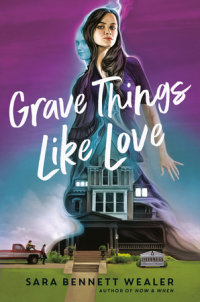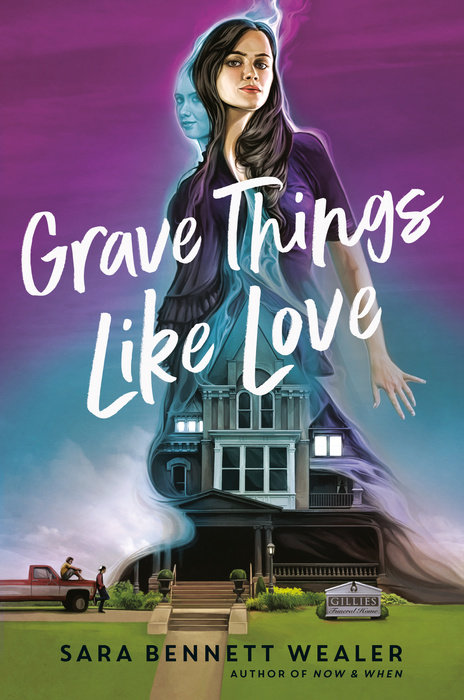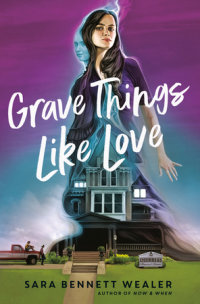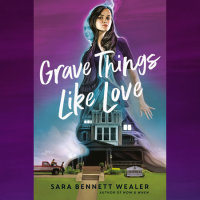Grave Things Like Love
Author Sara Bennett Wealer
A contemporary YA romance with a paranormal twist: what happens when in between trying to decide which boy is the right boy, a girl finds out the funeral home her family owns might be haunted?
Elaine's home is a bit . . . different. It's a funeral home that has been in her family since the 1800s—and it's why everyone calls her Funeral Girl. And even though she's lived there her whole life, there are still…
A contemporary YA romance with a paranormal twist: what happens when in between trying to decide which boy is the right boy, a girl finds out the funeral home her family owns might be haunted?
Elaine's home is a bit . . . different. It's a funeral home that has been in her family since the 1800s—and it's why everyone calls her Funeral Girl. And even though she's lived there her whole life, there are still secrets to be found.
When Xander, a cute new boy with a penchant for ghost hunting, arrives in town, Elaine feels an instant spark. His daring and spontaneous ways help her go from Funeral Girl to Fun Girl. Then there's Miles, Elaine's oldest friend, who she's starting to see in a completely new light.
After Xander convinces her to stage a seance one night, Elaine discovers that her home might be haunted by a kindred spirit—the daughter of the funeral home's original owner. But who wants to be haunted by the dead when there are boys to spend time with? After all, you only live once. . . .
An Excerpt fromGrave Things Like Love
CHAPTER ONE
There’s a dead body in my house, and before the day is out there will be at least two more.
The one here now is in the basement. The second is at the hospital getting unhooked, untubed, and readied for final discharge. The third is in a van, lost somewhere between here and Shasta Falls. I know this because the bell at the delivery bay hasn’t rung yet. And when I went to the main floor twenty minutes ago to bring my mom a sandwich for lunch, she was on the phone with the medical examiner’s office.
“He left at eleven?” I heard her say. “He should definitely be here by now.”
I snuck away to eat my own lunch up in my room on the third floor. I group-chatted Madison and Sienna about the Harvest Home concert tonight. I forgot about the bodies. And when I went back downstairs to see if the Dragonfly hoodie I ordered had been delivered, there’d still been no buzz from the door where our recently deceased clients arrive.
Mom’s head pokes…
CHAPTER ONE
There’s a dead body in my house, and before the day is out there will be at least two more.
The one here now is in the basement. The second is at the hospital getting unhooked, untubed, and readied for final discharge. The third is in a van, lost somewhere between here and Shasta Falls. I know this because the bell at the delivery bay hasn’t rung yet. And when I went to the main floor twenty minutes ago to bring my mom a sandwich for lunch, she was on the phone with the medical examiner’s office.
“He left at eleven?” I heard her say. “He should definitely be here by now.”
I snuck away to eat my own lunch up in my room on the third floor. I group-chatted Madison and Sienna about the Harvest Home concert tonight. I forgot about the bodies. And when I went back downstairs to see if the Dragonfly hoodie I ordered had been delivered, there’d still been no buzz from the door where our recently deceased clients arrive.
Mom’s head pokes into the hallway.
“Elaine. Can you get on the phone with Dakota and figure out how to direct him to the highway? He seems to have gotten himself turned around.”
I pause, thinking about my own phone upstairs in my room and my friends waiting to finalize our concert plans. Helping our clueless apprentice find his way back to the funeral home is nowhere on my list of things I want to be doing right now.
“Dakota’s phone has GPS,” I say.
Mom glances around, making sure no living clients are lurking in the foyer or the parlor or the visitation rooms. There aren’t any, but her eyebrows stay up and her voice keeps its even, friendly tone.
“GPS is what got him lost in the first place. Phones are fallible, you know. I put a map on the dash in the van, and from the way it’s been neglected I’m beginning to wonder if anyone even knows how to read one anymore.”
“I know how to read a map.” I brush past my mother into the office. “I also know anyone could have predicted that Dakota would get lost.”
“Well, he’s all we had. Your dad would have gone, except he’s busy with Mr. Pagoni. And who knows when the hospital will release Mrs. Keener? Dakota was drafted and now here we are. I swear if this day gets any more hectic, I’ll need a cocktail by two.”
She scrubs a hand through her hair, dropping the placid façade that we are all expected to maintain while on the main floor of the house, where there’s always a chance of running into somebody grieving the loss of a loved one. I’m lucky not to have been roped into corpse chauffeur duty; I know this. The least I can do is help out.
Dakota picks up after just one ring.
“Lainey, hey,” he says. “Sorry to bug you but I am literally out in the middle of nowhere. GPS wanted to take me around some construction; now I’m on this dirt road going through a big-assed cornfield.”
I smile, picturing Dakota in his hipster glasses and bow tie, driving a fully loaded funeral-home van through the back roads of Clark County. He just finished mortuary school, and he’s supposed to be learning the ropes of the funeral business with us. But sometimes it seems like all he’s really learning is increasingly creative ways to mess up. I almost wish I could be there to witness if he runs out of gas and has to ask a farmer for help. But that would back things up even more, and Mom already looks like she’s ready for wine-o-clock.
I sit at her desk and pull up a map on the computer.
“What was the last sign you saw?”
“Ummm . . .” Dakota always does this humming-under-his-breath thing when he’s trying to concentrate. “I don’t know. Shelbyville? That was, like, five miles back.”
“Shelbyville is the exact opposite direction of where you want to go. Can you pull over and turn around?”
I hear him sigh, then hear the crunch of gravel as he maneuvers the van to the side of the road.
“If you’re near Shelbyville, then you’re close to Philipsburg and Lester,” I tell him. “Route Eight runs through both of those. Whichever one you hit, find Route Eight going north. That will take you back to the highway. I assume you can take it from there?”
“Yeah, I can find it. Thanks, Lainey, you’re the best.”
It’s what everyone says--the elderly ladies when I play piano for their friends’ services; Mom when I update the software on the office computers; Dad when I make coffee at 3:00 a.m. after the business phone rings, summoning him to the hospital or someone’s house.
You’re the best, Lainey. We always know we can count on you.
“He should be on his way,” I tell Mom as I start for the door, my mind already back with Madison and Sienna.
“Not so fast!” she says. “Did your dad talk to you about the parade?”
I freeze. The Harvest Home parade kicks off the big community fall festival, and it’s the reason I’m not at school today. We’re off because every scout troop, marching band, sports team, politician, and local business within a thirty-mile radius takes part. People love Harvest Home because it’s fun in a carny-rides-fair-food-and-has-been-country-band kind of way. School closing for a day doesn’t hurt, either.
Mom reaches to the top of a shelf sagging with casket catalogs. She takes down a top hat with a veil cascading from its brim. She hands the hat to me.
“We need you to drive the buggy.”
“Seriously? No!”
“The buggy” is what we call the Victorian hearse that is parked under a canopy next to the house. It’s been in our family since Victorian times, which is when my great-great-great-grandfather Leathan Gillies established the funeral home. The buggy is made of polished black wood that rises in a big rectangle with windows on all four sides. The windows are decorated with purple velvet curtains, GILLIES FAMILY FUNERAL HOME emblazoned across the glass in silver script. A gleaming mauve casket sits inside--empty, of course.
The buggy is pulled by two horses, which my parents borrow from an Amish farm outside of town. It’s a rolling advertisement. It’s our brand: time-honored and trustworthy--a single family serving the community for generations.
When I was little, I rode with my dad, and he would show me how to control the horses. I used to love how the wood-and-steel wheels clacked down the road. Now the thought of it makes me cringe. Not so much because I’ll have to steer two massive animals from eight feet off the ground by myself, but because when the buggy comes out for things like the Harvest Home parade, it entails dressing up in the hat my mom currently holds, along with a fitted black coat, high-collared shirt, and a skirt complete with bustle, under which must be worn an actual, honest-to-God corset.
Driving the buggy in the Harvest Home parade means riding through town dressed up like a character from a Dickens novel.
No thank you.
“Dakota will be back soon. Have him do it. Please?”
“After this morning’s GPS confusion, we are giving Dakota a break,” Mom says. “Dad needs help downstairs. Besides, it looks better if someone from the family does it.”
That’s my mom, always thinking about appearances. Dad handles the bodies and everything that goes with them--caskets, vaults, death certificates, stuff like that. Mom takes care of stuff like finances and public relations. She goes to every festival, fair, and fundraiser, schmoozing and networking and making sure we are the first one people think about when Grandma or Grandpa dies. She should be wearing the corset and top hat.
“I’m riding in the vice mayor’s car,” she tells me before I can even suggest It. “We’re being recognized for underwriting the new auditorium at city hall.”
“What about Astrid?” My sister is a long shot, but I’m desperate. My anxiety has been barely noticeable these past couple of days; now I feel a warning zap as the worry starts flickering to life.
“She’s marching with the pom squad,” says Mom. “I know it’s outside your comfort zone, but your father and I both think you’re responsible enough. Do you have something better to do?”
Actually yes. I do. I was planning to meet my friends at the cookout after the parade for the festival’s kickoff concert. I did not plan on doing that dressed like an old-timey Morticia Addams.
Mom pulls a garment bag out of the closet and hands it to me.
“You’ll be great, I’m sure.” She lowers herself into her desk chair, flashing a smile before starting to clack away on the computer. “They want everyone at the fire station by three for lineup. Thanks, Elaine. You’re the best.”
The veil from the hat drags on the floor as I trudge back into the hall. Anger sprouts inside me, making me want to drop the hat and stomp on it. I strangle the anger at its roots. One lesson I learned a long time ago is that one does not throw a tantrum in the foyer of a funeral home.
My little sister bounces down the main stairs, a sequin-overflowing weekend bag at her hip. She is not dignified or unobtrusive or any of the things we are expected to be on the first floor of the house. If a grieving client walked in, they’d be greeted by the sight of a thirteen-year-old in false eyelashes and booty shorts, checking her slicked-back ponytail in the mirror over the guest-book table. From his frame above the table, Great-Great-Great-Grandfather Leathan looks on with the same grimly disappointed expression he’s worn for more than a century.
“Is something wrong with the back way?” I ask.
“Sophia’s picking me up out front,” Astrid says. “The back creeps her mom out.”
She says this matter-of-factly, like it’s no problem to have your friends think the back of your house is creepy. And yet it is creepy--or at least a lot of people would think so--because that’s where the garages are where we park the vans and the actual hearses that we use for actual funerals. It’s also where the delivery bay is, where in the next hour or so two more bodies will be dropped off.
The back is where my family is supposed to enter and exit on our way to the second- and third-floor living quarters. It’s where dead people enter and exit too. That’s the way things have always been, and to know that Sophia’s mom is turning up her nose at it makes me mad all over again. I’m mad she said it. I’m mad Astrid didn’t set her straight. I’m mad that I have to wear a Victorian undertaker’s costume and drive a horse-drawn hearse while my sister marches in a cute pom uniform like a normal person.
“I could take you,” I offer. There was a time, not long ago, when she would have dropped everything in a heartbeat if it meant getting to hang out with her big sister. I actually miss that, plus driving her wherever she needs to be would let me stall on getting where I need to be.
“Yeah . . . no.” She side-eyes the hat and garment bag. “Did Mom tell you where they’re putting you?”
Ouch. I work my face into a smile that says I’m joking but also sort of not.
“I don’t think we find that out until we get to the parade route,” I tell her. “But I hope it’s right behind you guys so I can yell how much I love you as loud as possible for the whole . . . entire . . . way. I’ll make sure I do it by name, cool?”
She shudders as a car honks from the street outside. Astrid trots out the door and down the walk to a big SUV. I can just glimpse Sophia’s mom in the driver’s seat, all shiny hair and designer sunglasses. She’s talking to the other pom girls in the back and doesn’t even glance this way. Apparently, she’s too busy to be creeped out now.
How nice of her.
I watch them drive off. Then I head back up to my room in the attic, using the back stairs because it’s the right thing to do.
My phone sits on my bed, the screen crawling with texts from my friends.
Jaxon is for sure going tonight so I need to get him on the Ferris wheel. That’s Sienna, the hopeless romantic, obsessing over the guy she’s had a crush on since fourth grade. Ferris wheel = cuddles & kisses.
Ferris wheel also = dangerous af, warns Madison, who is even more type A than me, a rule follower to the extreme. Those rides are never inspected properly--they just load them off a truck and set them up and hope nobody gets killed.
It’s fine, says Sienna. If it breaks down that’s more time together--and if I’m scared then he’ll have to cuddle.
Madison posts an eye-roll emoji. Still dangerous. Elaine will back me up on this, right, Elaine?
Elaine?
Hello . . . ?!
I scramble to get back into the conversation.
Sorry! Got stuck downstairs--and I avoid rides even when they’re not assembled by carnies, so my opinion is probably not valid here.
Yes it is! says Madison.
Boo, says Sienna.
But don’t do anything until I get there--I just got told I have to meet you at the end of the parade.
K--at the fountain? asks Sienna.
Probably the parking lot--as of 5 mins ago I am now *in* the parade.
Oh God . . . , says Madison.
I know--I’m gonna need to find someplace to change.
I send them a photo of the top hat sitting on the garment bag.
Sienna: Uhhhhh . . .
Madison: This could only happen to you.
Me: Tell me about it.
Sighing heavily, I pull off my leggings and sweatshirt. Then I pull on a pair of black tights and a chemise. Next, I lace up the corset and step into the bustle cage. Petticoats, skirt, high-collared shirt buttoned to my chin, and my braid fastened into a bun at the nape of my neck . . . I’m almost ready to go.
I tie the black ankle boots, grab the jacket, gloves, and hat, and then head back out, down through the living room and kitchen, down the back stairs again, past the door that opens onto the first floor, and down another level to the basement, where my dad is hard at work on dead body number one.
CHAPTER TWO
At the bottom of the stairs is a world completely different from the warm woods and fresh, fragrant flowers of the main floor. Passing through a nondescript door just beyond the back parlor, you descend into white walls, tile floors, and the faintest trace of a chemical smell.



